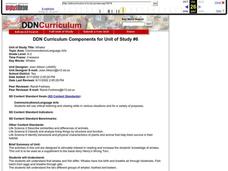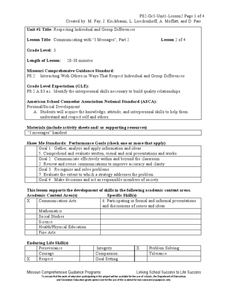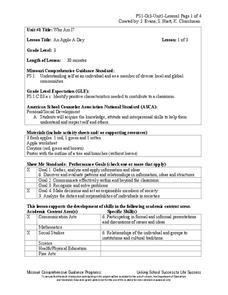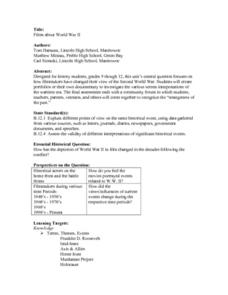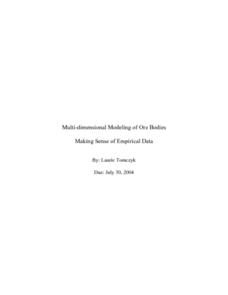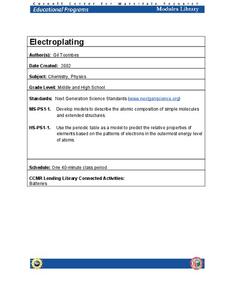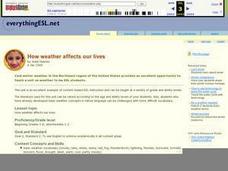Curated OER
Whales
Students compare the differences between whales and fish. They examine the differences of toothed and baleen whales. They identify behavioral and physical characteristics of animals that help them survive in their habitat.
Curated OER
Communicating with "I Messages", Part 2
Third graders listen to ways they share their feelings with others. After brainstorming situations where "I messages" would be appropriate, pairs of students write messages from the lists they developed. They discuss how their messages...
Curated OER
Using I-Statements
Fifth graders brainstorm a list of life-changing events. As a class, they practice making I-statements and identify what to avoid when putting them together. To end the lesson, they determine which of their statements can be used in...
Curated OER
Freedom and Dignity Project
Students research the economic impact of the Revolutionary War on a variety of occupations. They examine and discuss the topic of whether political leanings influenced the economic outlook.
Curated OER
An Apple A Day
Third graders brainstorm a list of how they can tell if someone feels bad about themselves. As a class, they describe three different apples shown to them. Individually, they cut out shapes of apples and color them to place them on a...
Curated OER
Fort Life in the Green Bay Area, 1816-1841
Ninth graders examine from the perspectives of military personnel, Native Americans, families of soldiers, and civilians who lived and worked in the region during the era. They create a 2-page scrapbook layout from at least two of the...
Curated OER
Past Imperfect: Examining Secondary Sources of the American Revolution
Ninth graders respond in essay form to the following writing prompt. Mel Gibson, star of The Patriot, is quoted as stating, "If one were to adhere to historical accuracy all the way, you'd probably have the most boring two hours on...
Curated OER
Engaging Young Scientists with Inquiry: Part One
Building inquiry into your science lessons will make science concepts more concrete for your class.
Curated OER
Acing the Parent-Teacher Conference
Conducting a student-centered and data-driven conference will put the responsibility on the student and ensure that the meeting runs smoothly.
Curated OER
Why Do We Remember Revere? Paul Revere's Ride in History and Literature
Students examine primary documents regarding Paul Revere's ride and its role in the Revolutionary War. They consider how Revere's role has been written about by Longfellow and others and discuss the discrepancies between accounts.
Curated OER
Say Hi to Haibun Fun
What is a haibun? With this interesting lesson, writers will experience the Japanese writing form haibun, identify elements important to Japanese writing styles, analyze a haibun, and compose their own. Different from the typical journal...
Captain Planet Foundation
P is for Poppies
Explore the way local farming and rationing helped the war effort in World War I with a lesson plan on gardening. After learning about trench warfare, reading "In Flanders' Field" by John McCrae, and studying poppies, kids discuss the...
Captain Planet Foundation
Shape Shifters in the Math Garden
Combines mathematical measurement with gardening skills. Third graders hunt for worms in the garden and try to find the longest one. They also measure and weigh vegetables that they harvest from the garden, measure rainfall amounts, and...
Curated OER
Exploring "My Market"
A great way to determine if a career is right for you is to try it out. Learners explore the marketing career cluster by interviewing a person working in the marketing field and by developing a marketing-related service learning project....
Curated OER
Films About World War II
Ninth graders focus on how filmmakers have changed their view of the Second World War. They create portfolios or their own documentary to investigate the various screen interpretations of the wartime era and explain different points of...
Curated OER
Get Set For College
Students apply research skills to obtain information on training and education requirement for post-secondary requirements. They complete a scavenger hunt, complete a checklist and a college comparison worksheet.
Curated OER
Banned Book Week: Tips for Teaching Censorship
Consider how book censorship erodes our right to free speech and intellectual freedom.
Curated OER
Introducing Topographic Maps: Guiding Students from Concrete Models to Graphic Representations
Students interpret topographic maps and infer human activity as it is influenced by the landscape.
Curated OER
Multi-dimensional Modeling of Ore Bodies Making Sense of Empirical Data
Math scholars identify four different rock types in that strata and use this identification and data to construct a two dimensional geologic cross-section. They use data tables to construct a three-dimensional geologic cross-section.
Curated OER
Home Living/ Daily Live: Fire Safety
Learners with special needs discuss the importance of fire safety. They visit smokey.com, discuss where fires commonly occur, and how to prevent them. They then practice responding to a fire-related emergency.
Cornell University
Electroplating
Silver pennies and copper nickels are made possible by applying some chemistry. Learners use electrolysis to coat a penny with zinc sulfate and a nickel with copper sulfate. Their investigation builds an understanding of electroplating...
Curated OER
How Weather Affects Our Lives
English learners practice basic weather terms from listening to two books. They keep a daily weather record for two weeks to record the type of weather, as well as the high and low temperatures for each day. Next, they complete a simple...
Curated OER
Random Acts of Kindness For Kids
Develop a world-wide, email chain on which class members can showcase their acts of kindness. After defining the meaning of random acts of kindness through discussion and through a reading of Random Acts of Kindness,...
Curated OER
Lesson: Elizabeth Peyton: Artist's Community: The Real
What is real or imagined? The lines of beauty reality, and imagination are blurred in Elizabeth Peyton's portraits of her community. Learners analyze her use of artistic technique in conveying real and imagined communities. They then use...


